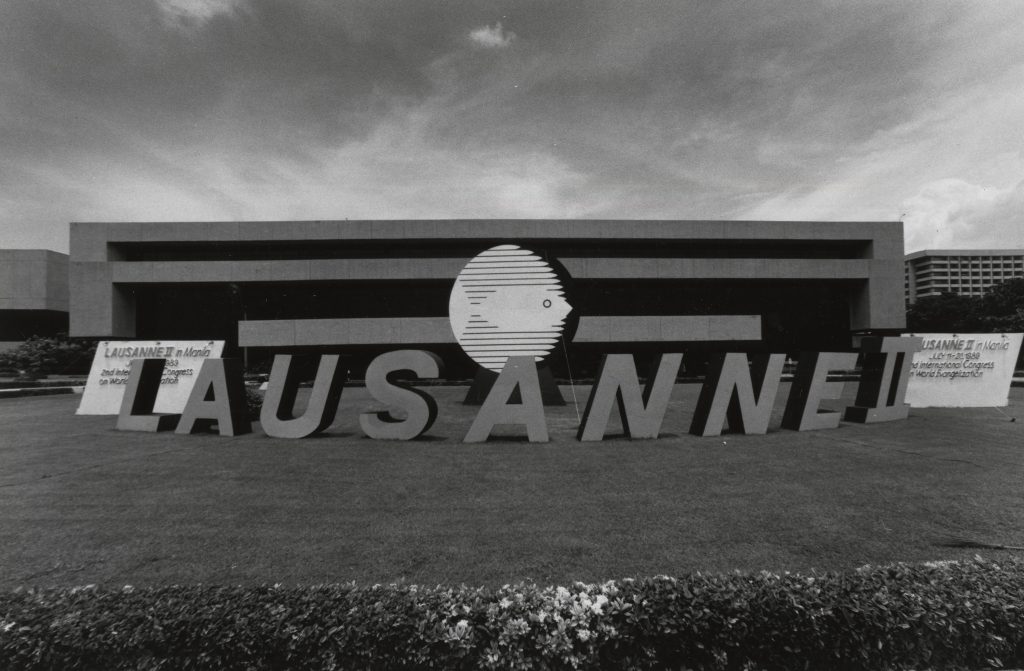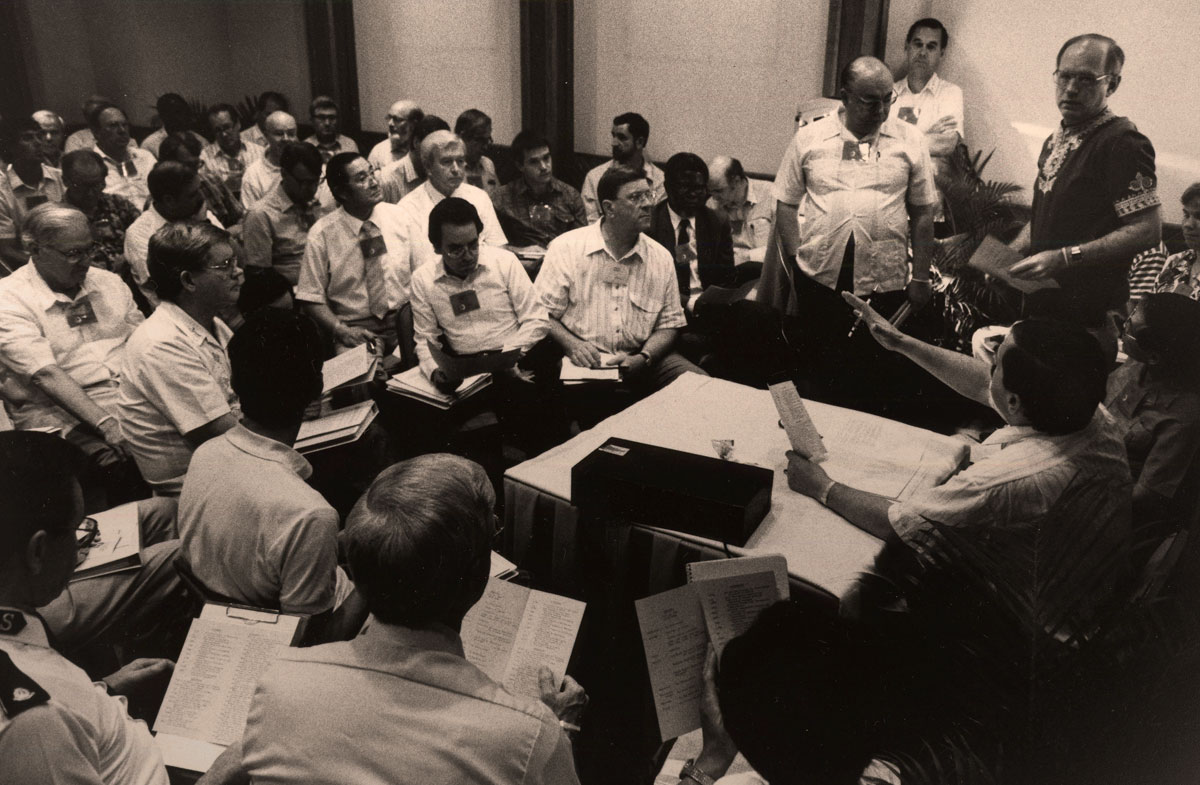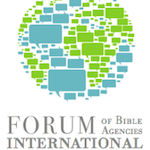Perhaps when Jesus gave his Great Commission, he knew that many centuries later, a single friendship between two men would give rise to an era of unprecedented partnership amongst the world’s Bible translation and distribution agencies, and through that partnership, the hopeful evangelization of all nations.
In 1989 Christian leaders from around the world convened once more in the spirit of friendship for the Second International Congress on World Evangelization (hereafter referred to as Manila 1989), a continuation of Billy Graham’s 1974 gathering in Lausanne, Switzerland.
Of the 45 different tracks offered at the congress, one almost didn’t make it into the programme: the topic of Bible distribution and translation. It had not been included in the early planning of the congress because it was assumed that the primacy of Scripture in world evangelization was obvious.

‘As a brand new member of the Lausanne Committee, I had the temerity to question this assumption,’ says Fergus Macdonald, then General Secretary of the Scottish Bible Society. ‘And in God’s providence, the Committee agreed to hold an additional congress workshop.’
Macdonald himself was appointed to lead the track, along with John Bendor-Samuel, then Executive Vice President of SIL International. The two men, who had hardly known each other before the gathering, bonded quickly and became lifelong friends. In keeping with Manila 1989’s emphasis on partnership and collaboration, they decided to invite leaders from a wide range of Bible agencies to gather in the same room, share their perspectives, and listen to each other.
What they were asking the participants to do was out of the ordinary. At the time, the world of Bible distribution and translation suffered from a history of disunity and lack of collaboration. There was competition over supporters and significantly differing opinions on issues like translation copyrights and preferred methods of distribution in restricted access nations that drove deep wedges between organizations. For the most part, each one worked alone.
Macdonald recalls, ‘During the actual week of workshops we had between 40-50 attendees, many of them Bible agency leaders. Our numbers contrasted with hundreds a few doors away at John Wimber’s workshop on Power Evangelism! But our relative smallness did not discourage us.’
Despite the small numbers, the history of rivalry, and the fact that the track had been thrown in last minute, something beautiful happened. ‘There was a sense of the Lord’s presence each day of the track which reinforced the belief that we all belonged together,’ says Macdonald. ‘At our last workshop, the Bible agency people said, “This has been great. We must do it again.”’
A unanimous decision was made to meet the following year in Horsleys Green, England, at SIL/Wycliffe’s UK centre, where representatives from over a dozen major Bible agencies agreed to set up an annual forum to encourage greater cooperation and minimise unnecessary competitiveness. The Forum of Bible Agencies International (FOBAI) was officially born, with Macdonald and Bendor-Samuel as its first co-chairs.
‘It’s important to recognise that we set up a roundtable, not another agency,’ says Macdonald. ‘Of course, the challenges didn’t go away, but there was now in existence a forum where we could interact with one another across a table rather than over a fence.’
The list of attendees seated around this first FOBAI roundtable included delegates from Wycliffe Bible Translators and its partner organisation Summer Institute of Linguistics, Open Doors, United Bible Societies, Scripture Union, Living Bible International (now Tyndale House Publishers), Bible League International, and GideonsUK, among others. Today FOBAI has grown to become an alliance of more than 35 leading international Bible agencies and other missions organizations working in more than 120 countries around the world.
Each of these organizations believes that access to the Bible, as the primary witness to the Lord Jesus Christ, is indispensable for world evangelization. As The Cape Town Commitment puts it,
‘We love the Bible as a bride loves her husband’s letters, not for the paper they are, but for the person who speaks through them. The Bible gives us God’s own revelation of his identity, character, purposes and actions. It is the primary witness to the Lord Jesus Christ. In reading it, we encounter him through his Spirit with great joy. Our love for the Bible is an expression of our love for God’ (I-6).
Despite centuries of missions activity, many people around the world continue to face barriers to having a relationship with their Creator because the Scriptures do not exist in a form they can understand. Of the almost 7,350 known languages, the complete Bible has only been translated into 692 of them.
At FOBAI’s annual meetings, delegates from each of the agencies gather to address this tremendous concern by working together to identify translation needs and adopt a global perspective in setting priorities. FOBAI also actively promotes programmes of Scripture advocacy and engagement aimed at helping churches to meet the challenge of diminishing Bible reading among Christians in Western countries.
Over the years, FOBAI has helped chart a common course for the various Bible agencies of the world: in 1994, the forum decided agencies should pursue greater cooperation at regional and national levels, as well as better connections with churches; in 2002, there was a decision to be more strategic through data gathering, advocacy, performance standards, and training; and in more recent years, development groups have been formed around Scripture Engagement, deaf needs, and media.
‘I suspect the key to the Forum’s success, under God, is that it is a forum, not a consortium, although we briefly considered using that title at the beginning,’ said Macdonald, now Chair Emeritus of FOBAI, at its most recent meeting in May 2019. ‘As a forum, FOBAI doesn’t take over its member agencies. Rather, it facilitates them as they fulfil their ministries.’
When Jesus told his disciples to take the gospel to the ends of the earth, he knew this would mean his Word would need to be translated into languages heard, seen, and felt, and that there would have to be creative, clear ways to connect people with his Word. He knew this would be a task that could not be done by one person, one culture, or one organization; it would require the work of many, and it would require them to work together.
Pray with Us
By Fergus Macdonald
Almighty God and loving Father, thank you for your Word which Jesus tells us is the seed of your kingdom. May that Word, as it goes out today around the world, accomplish your purpose, and not return to you empty. May the Holy Spirit enable millions of men and women, young people and children, to experience its life-transforming power. Prompt your people worldwide to offer prayers and financial resources that will accelerate the translation of Holy Scripture into every heart language and into every media.


